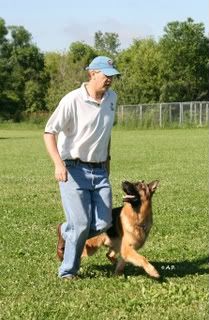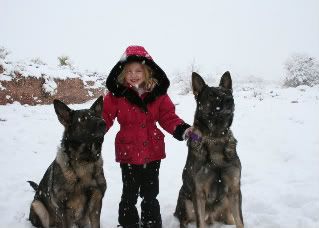 German and English Comands.....
#120075 - 12/07/2006 04:09 PM German and English Comands.....
#120075 - 12/07/2006 04:09 PM |
Webboard User
Reg: 10-10-2006
Posts: 28
Loc: Phoenix, AZ
 Offline Offline |
|
Hello everyone. Next week I am getting my first Working line GSD that I will be training for Schutzhund. I have been reading everything I can get my hands on and there is one thing (well there are a lot of things, but I am going to stick to one subject here) that I am a little unsure of to do with this puppy... what language do I start with?? In "Schutzhund Obedience Training in Drive w/ Gottfried Dildei by Sheila Booth" they recommend that German only be used for commands on the field so the dog knows the difference of what is expected (I assume that this also means using these commands when training at home, park ect.) and English for when the dog is in a non-working environment: i.e. at home in the house.
So I am posting this here and not in the puppy board because I really want to here the opinions of those who are in the sport not those who have just read or herd from there "Schutzhund Buddies."
Please let me know what you Language you started your puppy(ies) with, if you use both English and German depending on whether you are working or just at home or if you just use only one set commands all the time.
Thank you and I hope I have not made this more confusing than it needs to be.
-Rob
|
 Top Top
|
 Re: German and English Comands.....
[Re: Robert Bell ]
#120131 - 12/08/2006 01:14 AM Re: German and English Comands.....
[Re: Robert Bell ]
#120131 - 12/08/2006 01:14 AM |
Webboard User

  
Reg: 11-27-2005
Posts: 297
Loc:
 Offline Offline |
|
Wouldn't worry about it too much. Dogs understand tone of voice and situations and seem to predict remarkably well what you want from them even if you start using two or three commands to mean the same thing. I do however use German commands mostly on the field when I want the dog in-drive and obeying at the drop of a hat, while I use English commands to mean the AKC equivalent of what I want (heel, down)...although "sit" is always "sit". Again...it's all relative, you could probably use the same commands all the time and still get a different reaction depending on whether you're on the field or off the field.
|
 Top Top
|
 Re: German and English Comands.....
[Re: Kristine Velasco ]
#120133 - 12/08/2006 02:15 AM Re: German and English Comands.....
[Re: Kristine Velasco ]
#120133 - 12/08/2006 02:15 AM |
Webboard User

  
Reg: 10-25-2006
Posts: 320
Loc: Southern CA
 Offline Offline |
|
Growing up, our animals were bilingual (Polish and English), but the language didn't really matter. It was more tone of voice & general pack-leader abilities.
"A dog is a mirror of a man's soul" |
 Top Top
|
 Re: German and English Comands.....
[Re: Robert Bell ]
#120146 - 12/08/2006 07:48 AM Re: German and English Comands.....
[Re: Robert Bell ]
#120146 - 12/08/2006 07:48 AM |
Webboard User

  
Reg: 10-18-2006
Posts: 1849
Loc: St. Louis, MO
 Offline Offline |
|
Dog's don't think to themselves, "Ah that's German...he's serious." Or, "Cool, it's only English. I'll get around to listening."
While there are commands that can mean "NOW!" and "when you're ready," you could do the same thing in all English. The dog associates a response with a command. Doesn't matter what language it's in. For example, he could learn that "Down" means an immediate down and say, something like "splat" means a casual down. Silly, but you get my point?
In other words, use what you feel comfortable with. Whatever language your command is in needs to be said with confidence and if you're tripping all over a new language or a little unsure about it, the dog will pick up on that. You don't want a working dog thinking you're unsure!! 
Good luck.

Carbon |
 Top Top
|
 Re: German and English Comands.....
[Re: Amber Morgan ]
#120159 - 12/08/2006 10:24 AM Re: German and English Comands.....
[Re: Amber Morgan ]
#120159 - 12/08/2006 10:24 AM |
Webboard User
 
Reg: 03-19-2006
Posts: 107
Loc: Texas, Porter
 Offline Offline |
|
Hi Rob,
I am very new to all of this myself, so I am a beginner to boot, I personally like having two seperate commands, one meaning now and correct and one a bit more relaxed for the dog. My dog has only learned the English side of things at this time as he is still what I would call a puppy, he is only 9 months old, but I can assure you that I have made many errors along the way, so when it comes down to his more formal training I will need to switch the commands. Here is a good example of what I am refferring to, right now my dog Max knows Sit, some times his sit is a very good type of sit at others he has what I like to call an ugly sit, meaning his legs kind of spead out ) more than likely a beginner training error, but none the less he has a good sit as well with his legs up under neath him). So when I get down to more formal type of training I will switch over to the German commands for his working on the feild and get the sit perfect at that time. Had I been a better trainer maybe that would not be needed but I have only trained one other dog and he knew the difference between working mode and less formal modes as well. I did that with two seperate commands as well. I would also when we were going to WORK, ask him if he was ready to work, he would just get so excited that he could not see straight. So I kind of perferr the method of two different commands, does not matter the language so to speak, just two different command, one for formal feild work and the other for less formal type of stuff.
You will have a long way to go before you will be doing more formal training and you will still want along the way for your pup to begin his training, so I think two commands are the way to go. One when he is younger and you are not quite ready for making him be so formal and one for when you are ready for his more formal type of training. I know of some people who at Max's age have them doing long down stays and the like, I wanted for Max to be a puppy as long as he could be so needless to say he may not be as far along as some others would be with a more experienced trainer. At this time he will, Stand, Sit, Down, Place and walk nicely on a leash, all of those things were importand as Max at 9 months old is already at a lean 75 lbs and strong as an Ox. So you will have to kind of decide what you are wanting and when. You will find many opinions on when the right time for more formal training is, me I am going to wait until Max is about 15 to 16 months old before I begin to ask for a true formal heel for example. Yes I will be behind the curb as far as his BH and other things go, but what is really important to me at this time is the bond Max and I have. You will want your dog to see you as teh most fun person on this planet, I have done that very well with Max as he would rather play with me than any one else.
That is my New Trainer 2 cents, take it for what it cost you.
Thx,
Jay
|
 Top Top
|
 Re: German and English Comands.....
[Re: Jay Biles ]
#120216 - 12/08/2006 01:44 PM Re: German and English Comands.....
[Re: Jay Biles ]
#120216 - 12/08/2006 01:44 PM |
Webboard User

   
Reg: 09-14-2005
Posts: 587
Loc: Ontario, Canada
 Offline Offline |
|
Is there a requirement to use German language commands in Schutzhund or can the handler use whatever language they so desire?
|
 Top Top
|
 Re: German and English Comands.....
[Re: Brad . Martin ]
#122878 - 12/31/2006 05:51 PM Re: German and English Comands.....
[Re: Brad . Martin ]
#122878 - 12/31/2006 05:51 PM |
Webboard User
  
Reg: 02-25-2004
Posts: 559
Loc: Joliet, IL
 Offline Offline |
|
Hi Robert and Bradley. Read the rules for the organization you plan to trial under. It's also helpful to know what the judges might be most comfortable with, regardless of the rules. We show and trial under German judges, so we use German commands on the field. If you check out the "Links" at our training site http://www.JolietSchutzhund.com you will find a link to a site that gives you audio as well as "text" for the common commands in several languages.
That said, we have found it useful to use other *words* around the house than we do on the training field for similar commands (desired behavior) but different circumstances. For us, we consider that part of the compromise keeping "working dogs" (for us that means trial prospects) in the home. As an example, "Hier" is the recall command on the field in a training / trial environment. "come" is the command in the house which is different circumstances entirely - especially when it comes to ability to enforce.
I hope you find the language link helpful, and the other info too.
Beth
|
 Top Top
|
 Re: German and English Comands.....
[Re: Beth Fuqua ]
#122879 - 12/31/2006 05:55 PM Re: German and English Comands.....
[Re: Beth Fuqua ]
#122879 - 12/31/2006 05:55 PM |
Webboard User
  
Reg: 01-23-2006
Posts: 1608
Loc: Cali & Wash State
 Offline Offline |
|
Hi Robert,
I have always used German because it is traditional. One thing though, I've been told my "german" sounds a bit americanized & mangled to actual Germans! Oh well, I try.
|
 Top Top
|
 Re: German and English Comands.....
[Re: Brad . Martin ]
#122882 - 12/31/2006 07:10 PM Re: German and English Comands.....
[Re: Brad . Martin ]
#122882 - 12/31/2006 07:10 PM |
Webboard User
  
Reg: 10-18-2006
Posts: 1725
Loc: Las Vegas Nevada
 Offline Offline |
|
I use both on all my dogs but for Schutzhund you can use any language you want.
in the house when I tell my dog to down I don't expect a perfect down the way I expect it on the field.On the field I say platz and I expect a platz with attention , nice and straight.Also for healing when I go out for a walk around the block I don't use "fuss" I use heal ,so that he walks next to me but does not have to give me attention at all times .So it all depends how you want your dog to comply with what you are asking.
It was not hard to teach and them to understand the difference.
|
 Top Top
|
 Re: German and English Comands.....
[Re: Angelique Cadogan ]
#129859 - 02/18/2007 08:46 PM Re: German and English Comands.....
[Re: Angelique Cadogan ]
#129859 - 02/18/2007 08:46 PM |
Webboard User

Reg: 02-09-2007
Posts: 39
Loc: Australia
 Offline Offline |
|
I have just started teaching one of my dogs the commands in german...He already knows the english commands, but went back to basics when teaching him in german and was amazed at how fast he actually picked them up.
At first i coupled the command with the hand signal, 2 or 3 goes and he had it down pat.
I have a friend who uses both english and german with her dogs, and tends to use german when training so that her dog does not pre-empt her.
I am somewhat new to the whole schutzhund training thing, and it doesnt matter how much you read your always learning something new.
There's no psychiatrist in the world like a puppy licking your face. |
 Top Top
|
When purchasing any product from Leerburg Enterprises, Inc. it is understood
that any and all products sold by Leerburg Enterprises, Inc. are sold in Dunn
County Wisconsin, USA. Any and all legal action taken against Leerburg Enterprises,
Inc. concerning the purchase or use of these products must take place in Dunn
County, Wisconsin. If customers do not agree with this policy they should not
purchase Leerburg Ent. Inc. products.
Dog Training is never without risk of injury. Do not use any of the products
sold by Leerburg Enterprises, Inc. without consulting a local professional.
The training methods shown in the Leerburg Ent. Inc. DVD’s are meant
to be used with a local instructor or trainer. Leerburg Enterprises, Inc. cannot
be held responsible for accidents or injuries to humans and/or animals.
Copyright 2010 Leerburg® Enterprises, Inc. All rights reserved. All photos and content on leerburg.com are part of a registered copyright owned by Leerburg Enterprise, Inc.
By accessing any information within Leerburg.com, you agree to abide by the
Leerburg.com Privacy Policy and Terms of Use.
 Previous Topic
Previous Topic Index
Index Next Topic
Next Topic











 Top
Top







